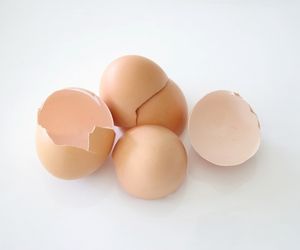Yes, dogs can eat eggshells, but it’s important to ensure they are crushed or ground into a fine powder to avoid any choking hazards or digestive issues. Eggshells can provide beneficial nutrients like calcium and amino acids, which can help with bone and teeth formation in dogs. However, it’s important to note that eggshells should not be the sole source of nutrition for your dog and should be given in small amounts as a supplement to a well-balanced diet.

Nutritional content & health benefits of eggshells for dogs
| Nutrients | Benefits for Dogs |
|---|---|
| Calcium | Essential for healthy bones, teeth, and muscles. Particularly important for growing puppies and lactating females. |
| Magnesium | Aids in nerve and muscle function, and is important for bone health. |
| Potassium | Helps regulate fluid balance, muscle contractions, and nerve signals. |
| Phosphorus | Important for bone and teeth formation, and plays a role in energy metabolism. |
Eggshells are composed primarily of calcium carbonate (94%)[1] , along with magnesium carbonate, calcium phosphate, and protein. Calcium carbonate is an effective form of calcium supplement that can provide the same benefits as calcium for dogs.
Dogs Should Be Fed With Raw Egg Shells Or Cooked Egg Shells?
Cooked eggshells are safer for your pet than raw ones, which can carry health risks that may put your pet’s life in danger. However, it’s important to avoid cooking the shells with other foods unless you’re certain those foods are safe for your dog to eat. Some spices commonly used in human food can be harmful to dogs, and foods high in oil and salt can lead to weight gain and bloating, which can ultimately be detrimental to your pet’s health.
How should you feed eggshells to your dog?
- It’s important to first sterilize them by boiling them for 10 minutes and then let them dry completely.
- Once the shells are completely dry, you can crush them into a fine powder using a mortar and pestle, a blender, or a food processor.
- You can then add the eggshell powder to your dog’s food in small amounts to avoid any digestive upset.
What are the risks of eating eggshells?
Eggshells can pose several risks if consumed in large quantities or in sharp, uncrushed pieces. Some of the risks of eating eggshells include:
- Choking hazard: If eggshells are not properly crushed or ground up, they can pose a choking hazard, particularly for small dogs or dogs that are prone to gulping their food.
- Digestive issues: If eggshells are not properly crushed, they can also cause digestive problems, such as constipation, diarrhea, or blockages in the digestive tract.
- Bacterial contamination: Raw eggshells can contain harmful bacteria such as salmonella, which can cause food poisoning in both dogs and humans. It’s important to properly wash and cook eggshells before feeding them to your dog to reduce the risk of bacterial contamination.
- Calcium toxicity: While calcium is an important nutrient for dogs, too much calcium can be harmful. If your dog consumes too many eggshells or other calcium supplements, it can lead to calcium toxicity, which can cause a range of health problems, including kidney damage and bone abnormalities.
Special care for puppies and pregnant dogs
Puppies and pregnant dogs require special care in terms of their diet. Feeding too many eggshells to puppies as a source of calcium can result in health issues such as defective bone formations. Pregnant dogs may also experience a rise in calcium levels if they consume eggshells frequently, which can lead to a condition called eclampsia. It is important to consult with a pet nutritionist to ensure a balanced diet for dogs in all life stages.
What did we learn from all this?
Dogs can eat eggshells, but it’s important to take precautions to ensure their safety. Eggshells can provide valuable nutrients like calcium and amino acids, which can benefit bone and teeth formation in dogs. However, eggshells should not be the sole source of nutrition for your dog and should be given in small amounts as a supplement to a well-balanced diet.
Cooked eggshells are safer than raw ones, and it’s important to sterilize and finely crush them before adding them to your dog’s food. Also make sure you know about the risks of feeding eggshells to dogs like choking hazards, digestive issues, bacterial contamination, and calcium toxicity.
References
- What are egg shells made of? AskUSDA: U.S. Department of Agriculture ↩
